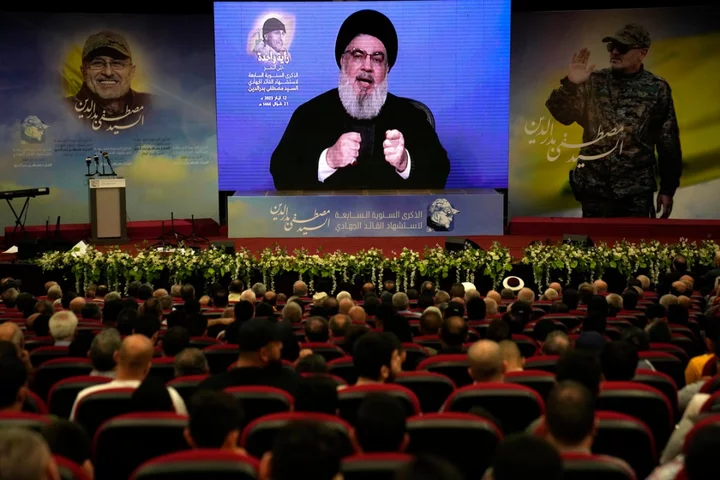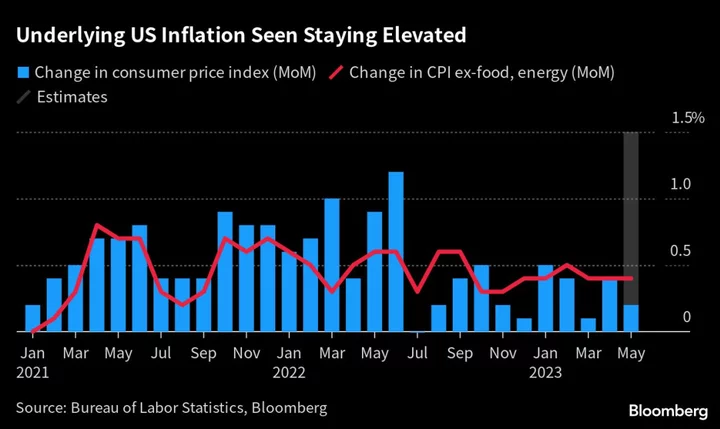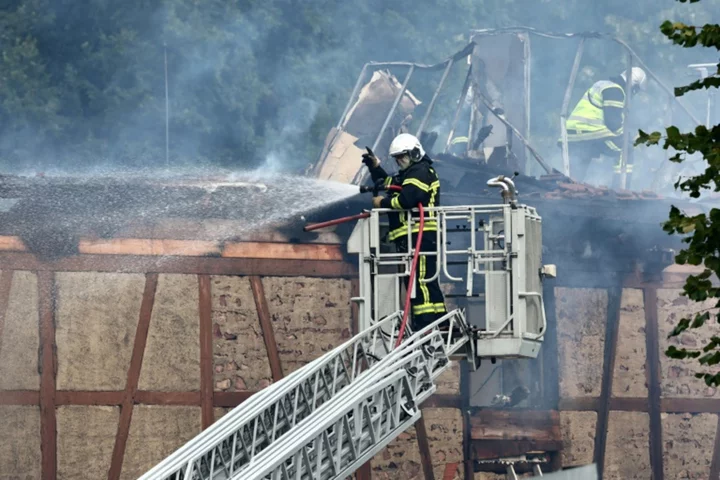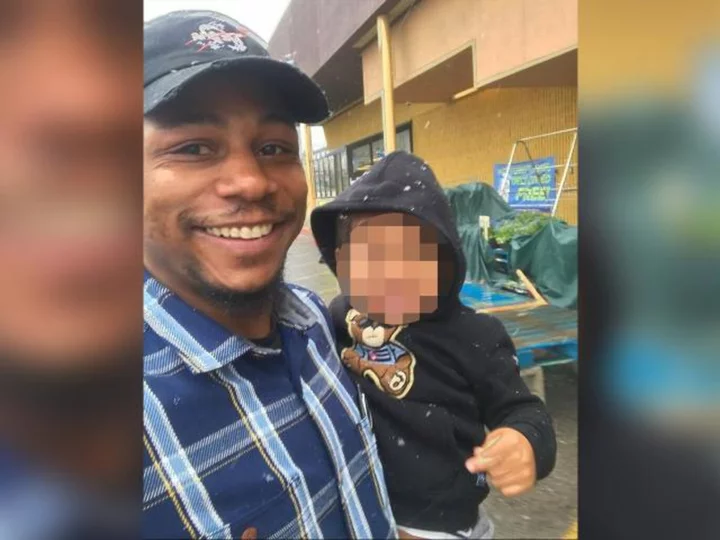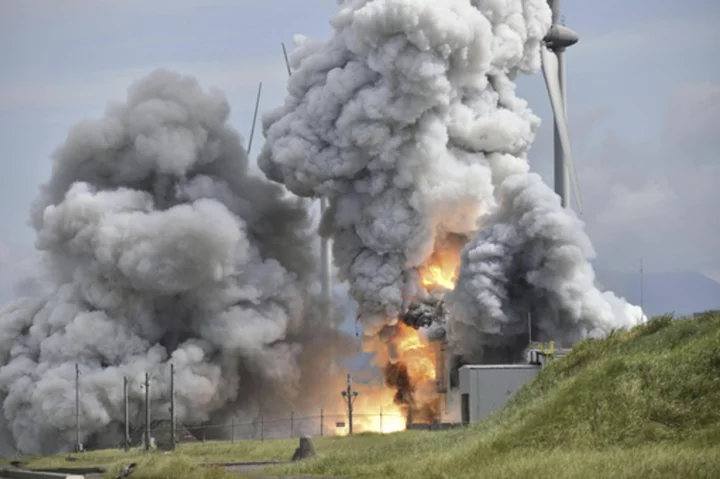The leader of Lebanon’s Hezbollah militant group has denounced as "baseless lies" reports that one of Syria’s most well-known drug dealers, who was killed earlier this week in an airstrike near the Jordanian border, was linked to the Iran-backed group. Sayyed Hassan Nasrallah's televised speech on Friday came four days after the rare strike that some Syrian opposition activists claimed was carried out by Jordan’s air force. The activists and a war monitor said the amphetamine Captagon kingpin killed Monday was among the most wanted by Jordanian authorities for drug smuggling across the border with the backing of a small militia. Syrian activists say Merhi al-Ramthan, who was killed with his wife and six children, worked closely with militias linked to Syrian President Bashar Assad and Iran-backed Hezbollah. Western governments estimate that Captagon has generated billions of dollars in revenue for Assad, his Syrian associates and allies. Damascus has denied the accusations. “Had we been making billions of dollars it would have been noticed,” Nasrallah joked about the charges. Speaking about linking al-Ramthan to Hezbollah, Nasrallah said “these are lies and unjust charges.” Nasrallah added that had it not been for Hezbollah’s help, the Lebanese state would not have been able to carry out raids against drug dealers in Lebanon. Hezbollah enjoys wide influence in northeast Lebanon, a region that for decades has been a center of drug production. Monday’s strike in southern Syria that killed al-Ramthan and another that destroyed a factory came a day after Arab governments reinstated Syria to the Arab League following the country’s suspension for its crackdown on protests that ultimately led to a lengthy civil war. As Arab governments gradually restore ties with Damascus, one of the key topics of discussion has been Syria’s illicit drug industry, which has flourished during the ongoing conflict — especially the illegal amphetamine Captagon. “These are baseless lies. For us Captagon and other types of drugs are religiously prohibited,” said Nasrallah, a Shiite Muslim cleric and major political figure in Lebanon. Speaking about reconciliation between Syria and oil-rich Arab countries, Nasrallah said anti-Syrian politicians in Lebanon are “disconnected from reality” and are working to keep Beirut’s relations with Damascus cold. “It is in Lebanon’s interest to fix relations with Syria,” Nasrallah said, adding that the Lebanese government should send a high-ranking delegation to Damascus to discuss ways to address the refugee crisis that has pushed hundreds of thousands of Syrians to flee into in Lebanon. Sentiments against Syrian refugees have been rising in Lebanon since the country’s massive economic meltdown that started in 2019 that has left three quarters of the Lebanese population living in poverty. Hezbollah sent thousands of fighters to battle alongside Syrian government forces during the 12-year war, helping tip the balance of power in Assad’s favor. Read More Ukraine war’s heaviest fight rages in east - follow live Charity boss speaks out over ‘traumatic’ encounter with royal aide Inflation in Argentina leaves familes struggling to feed themselves Nissan reports surging profit amid strong sales, easing chip crunch Arab governments vote for Syria's return to the Arab League
The leader of Lebanon’s Hezbollah militant group has denounced as "baseless lies" reports that one of Syria’s most well-known drug dealers, who was killed earlier this week in an airstrike near the Jordanian border, was linked to the Iran-backed group.
Sayyed Hassan Nasrallah's televised speech on Friday came four days after the rare strike that some Syrian opposition activists claimed was carried out by Jordan’s air force. The activists and a war monitor said the amphetamine Captagon kingpin killed Monday was among the most wanted by Jordanian authorities for drug smuggling across the border with the backing of a small militia.
Syrian activists say Merhi al-Ramthan, who was killed with his wife and six children, worked closely with militias linked to Syrian President Bashar Assad and Iran-backed Hezbollah.
Western governments estimate that Captagon has generated billions of dollars in revenue for Assad, his Syrian associates and allies. Damascus has denied the accusations.
“Had we been making billions of dollars it would have been noticed,” Nasrallah joked about the charges. Speaking about linking al-Ramthan to Hezbollah, Nasrallah said “these are lies and unjust charges.”
Nasrallah added that had it not been for Hezbollah’s help, the Lebanese state would not have been able to carry out raids against drug dealers in Lebanon. Hezbollah enjoys wide influence in northeast Lebanon, a region that for decades has been a center of drug production.
Monday’s strike in southern Syria that killed al-Ramthan and another that destroyed a factory came a day after Arab governments reinstated Syria to the Arab League following the country’s suspension for its crackdown on protests that ultimately led to a lengthy civil war.
As Arab governments gradually restore ties with Damascus, one of the key topics of discussion has been Syria’s illicit drug industry, which has flourished during the ongoing conflict — especially the illegal amphetamine Captagon.
“These are baseless lies. For us Captagon and other types of drugs are religiously prohibited,” said Nasrallah, a Shiite Muslim cleric and major political figure in Lebanon.
Speaking about reconciliation between Syria and oil-rich Arab countries, Nasrallah said anti-Syrian politicians in Lebanon are “disconnected from reality” and are working to keep Beirut’s relations with Damascus cold.
“It is in Lebanon’s interest to fix relations with Syria,” Nasrallah said, adding that the Lebanese government should send a high-ranking delegation to Damascus to discuss ways to address the refugee crisis that has pushed hundreds of thousands of Syrians to flee into in Lebanon.
Sentiments against Syrian refugees have been rising in Lebanon since the country’s massive economic meltdown that started in 2019 that has left three quarters of the Lebanese population living in poverty.
Hezbollah sent thousands of fighters to battle alongside Syrian government forces during the 12-year war, helping tip the balance of power in Assad’s favor.
Read More
Ukraine war’s heaviest fight rages in east - follow live
Charity boss speaks out over ‘traumatic’ encounter with royal aide
Inflation in Argentina leaves familes struggling to feed themselves
Nissan reports surging profit amid strong sales, easing chip crunch
Arab governments vote for Syria's return to the Arab League

